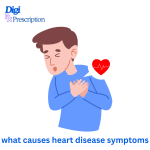
Understanding the causes behind heart disease symptoms is crucial for prevention and early intervention. Various factors contribute to heart problems, leading to symptoms such as chest pain, shortness of breath, dizziness, and fatigue.
1. High Blood Pressure (Hypertension)
-
Increased pressure in the arteries forces the heart to work harder, leading to thickened heart muscles and an increased risk of heart failure.
-
Symptoms: Headaches, dizziness, and chest discomfort.
2. High Cholesterol
-
Excess cholesterol leads to plaque buildup in the arteries, restricting blood flow and increasing the risk of heart attacks.
-
Symptoms: Often asymptomatic but may cause chest pain (angina).
3. Smoking and Tobacco Use
-
Nicotine and carbon monoxide damage blood vessels, increasing clot formation and narrowing arteries.
-
Symptoms: Chest pain, irregular heartbeat, and shortness of breath.
4. Diabetes and Insulin Resistance
-
Symptoms: Increased thirst, frequent urination, fatigue, and slow-healing wounds.
5. Poor Diet and Obesity
-
Diets high in trans fats, sugars, and processed foods contribute to obesity and metabolic disorders that increase heart disease risk.
-
Symptoms: High blood pressure, chest pain, and swelling in the legs.
6. Lack of Physical Activity
-
Inactivity leads to poor circulation, weight gain, and weakened heart muscles.
-
Symptoms: Fatigue, shortness of breath, and sluggish circulation.
7. Stress and Mental Health Issues
-
Chronic stress releases hormones like cortisol, which can raise blood pressure and contribute to arterial inflammation.
-
Symptoms: Heart palpitations, anxiety, and high blood pressure.
8. Excessive Alcohol Consumption
-
Overconsumption weakens the heart muscle, leading to cardiomyopathy and irregular heartbeats.
-
Symptoms: Fatigue, irregular heartbeat, and swelling in the legs.
9. Genetic and Family History
-
If close family members have heart disease, the risk increases. Genetic predisposition may cause high cholesterol, high blood pressure, or structural heart defects.
-
Symptoms: Vary depending on the specific inherited condition.
10. Viral and Bacterial Infections
-
Infections such as rheumatic fever and viral myocarditis can lead to heart inflammation and long-term complications.
-
Symptoms: Fever, chest pain, irregular heartbeat, and weakness.
Preventing Heart Disease Symptoms
-
Maintain a balanced diet rich in whole foods, lean proteins, and healthy fats.
-
Exercise regularly (at least 150 minutes per week of moderate activity).
-
Quit smoking and limit alcohol intake.
-
Regularly monitor blood pressure, cholesterol, and blood sugar levels.
-
Seek medical attention if experiencing symptoms like persistent chest pain, dizziness, or shortness of breath.
Understanding the causes of heart disease symptoms can help individuals make proactive lifestyle changes and seek timely medical care. A heart-healthy lifestyle is the best defense against cardiovascular issues.
References:
-
American Heart Association (AHA) – Risk Factors for Heart Disease
https://www.heart.org -
Centers for Disease Control and Prevention (CDC) – Heart Disease Facts & Prevention
https://www.cdc.gov/heartdisease -
National Heart, Lung, and Blood Institute (NHLBI) – Causes of Heart Disease
https://www.nhlbi.nih.gov -
Mayo Clinic – Heart Disease Symptoms & Causes
https://www.mayoclinic.org -
World Health Organization (WHO) – Cardiovascular Disease Prevention
https://www.who.int/health-topics/cardiovascular-diseases
